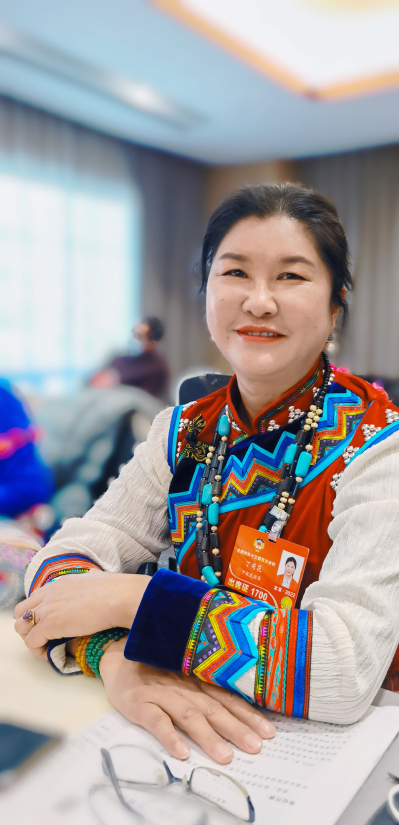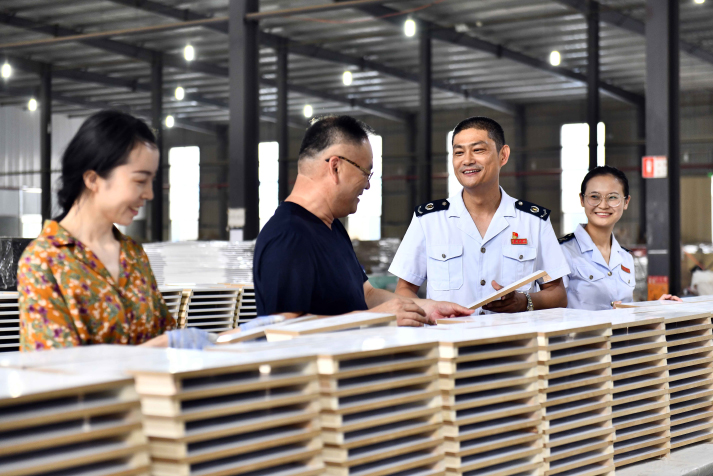| China |
| New policies are set to further relieve pandemic strain on enterprises | |
|
|
 Ding Xiuhua attends the Fifth Session of the 13th Chinese People's Political Consultative Conference National Committee on March 6 (COURTESY PHOTO)
During a press conference on March 11, Premier Li Keqiang recalled his conversation with a dozen business people in 2021. They each talked about their individual corporate difficulties and their hopes for more government-led macro policy support. Li presented them with three relief options from which they could select their preferred one. First, massive investment to help them get orders; second, distribution of consumption vouchers to boost consumer spending; and third, tax and fee reductions. "They were silent for a moment and then almost unanimously went for the third option, as they believed it would work in the most direct, equitable and efficient way," Li said. Their choice has now been taken into consideration in government policymaking. The government work report delivered by Li on March 5 at the Fifth Session of the 13th National People's Congress revealed that tax and fee reductions totaled over 1 trillion yuan ($157.6 billion) in 2021 and this number is set to rise in 2022. "We will implement a new package of tax-and-fee policies to support enterprises," the report read. "We will continue to take temporary steps and institutional measures and apply policies for both tax reductions and refunds," adding that tax refunds and cuts are expected to total around 2.5 trillion yuan ($393 billion) this year. Concerted strategizing "This is an ambitious target," Ding Xiuhua, a member of the 13th Chinese People's Political Consultative Conference (CPPCC) National Committee from Nujiang Lisu Autonomous Prefecture in Yunnan Province, told Beijing Review. She has put much of her focus on the Central Government's tax and fee reduction policies this year. "Tourism is one of Nujiang's pillar industries and has been heavily affected by the pandemic," Ding said. "The government has issued various support policies since 2020 and the new 2022 target demonstrates its strong resolve to help enterprises with measures ranging from tax exemptions to monetary support." One clear sign boosting her confidence is that the government work report has set a specific timeframe for the refunding of outstanding value-added tax (VAT) credits to micro and small enterprises. "It clearly states the refunding should be completed by the end of June," Ding said. Li explained this policy during a press conference on March 11. "Tax refunds will be the policy highlight for 2022. Under the current VAT tax code, there will be tax collection first, followed by refunds for enterprises. This year, we will refund in advance the existing overpaid VAT credits with a lump sum worth 1.5 trillion yuan ($236 billion)." Ding revealed that in 2021, the sum of tax and fee cuts in Nujiang increased by 97.96 million yuan ($15.4 million). This year, with intensified measures to ease the strain on businesses, this sum is expected to go up. Considering the financial burden on lower-level governments to implement such policies, the 2022 central and local budgets adopted at the NPC session have increased transfer payments to local governments from the central general public budget by about 1.5 trillion yuan to 9.8 trillion yuan ($1.54 trillion), marking an 18-percent growth. "This is significantly higher than previous years," the report said. Supporting policies since 2020, as Ding explained, have allowed local enterprises struggling with the pandemic to catch their breath. Travel agencies, for example, have taken the opportunity to train employees or learn from neighboring cities to improve service levels. The governments of Yunnan and Nujiang also released new policies in February, streamlining administrative procedures to further enhance their overall business environment. After grappling with extreme poverty for years, before its complete eradication in late 2020, Nujiang's infrastructure construction has seen great progress. Roads were paved and a new airport is underway. "The marvelous landscape has provided our prefecture with unique tourism resources," Ding added. "The pandemic will end one day and I wholly believe tourism in this wonderland will flourish."  Staff from a tax bureau in Heze City, Shandong Province, introduce preferential tax policies to a local company on June 16, 2021 (XINHUA)
Aviation support Wang Yu, President of Shanghai-based Spring Airlines and a member of the 13th CPPCC National Committee, also expressed his optimism for the prospects of the aviation sector despite the severe COVID-19-induced industry losses over the past two years. "China's aviation industry has lost 181.7 billion yuan ($28.6 billion) since the outbreak of the pandemic, and airline losses accounted for 82 percent of that total," Wang said. He predicts the situation in 2022 will still be severe, but believes the pandemic has only reduced the development pace of the aviation sector as China has a huge domestic market and its economy is extremely resilient. His confidence is further substantiated by the government's supporting policies. "The work report states that these policies will be weighted more heavily toward enterprises harshly affected by COVID-19, including catering, hospitality, retail, culture, tourism and passenger transport," Wang said. "This is very encouraging." Prior to that, in February, China's top economic planner, the National Development and Reform Commission, along with several other government departments, released a raft of measures to shore up support for businesses in the service industry, outlining 43 policy measures including the "one-year suspension of the VAT prepayment by railway and civil aviation enterprises," to provide fiscal and logistical backing for those service companies particularly hard hit by the pandemic. "The package of support policies is like a first-aid kit. It allows us to improve our cash flow," Wang said. The International Air Transport Association estimates the aviation industry can recover to the level of 2019 in 2024. Wang believes China's aviation industry will enter its prime once the pandemic ends. "Spring Airlines will stick to the plan of introducing eight to 10 airplanes this year alone," he said. (Print Edition Title: Easing the Burden) Copyedited by Elsbeth van Paridon Comments to yuanyuan@cicgamericas.com |
|
||||||||||||||||||||||||||||||
|